In a world where every day can feel like an uphill battle, especially for those grappling with depression, finding a foothold in the chaos can seem elusive. Some mornings, simply getting out of bed feels monumental, and the idea of a structured day might seem like a distant dream. Yet, maintaining structured routines in everyday life is crucial for fostering psychological resilience and coping mechanisms during stressful events. The small rituals we craft can become anchors, giving us a sense of control and purpose.
Reflecting back, I remember when my life felt like a whirlwind of unpredictability. It wasn’t until I embraced the magic of a supportive routine that I began to see glimmers of light. Each day, with each slow, deliberate step, I found strength in the ordinary. Morning sunlight streaming through the window, a cup of tea in hand, and the comforting rhythm of a journal page turning—my world felt a little more mine with every ritual.
These small, realistic practices can build a strong foundation to hold us steady amid life’s storms. Let’s explore how creating a depression-friendly daily routine can offer structure and a profound sense of solace and healing.
Introduction
Depression is a feeling of deep sadness that does not go away. It can make people feel tired and unhappy all the time. This feeling can make everyday tasks very difficult.
Having a regular daily plan can help people feel better. A plan helps people know what to expect each day. This can make them feel more in control and less stressed.
Doing things simultaneously each day, like eating and sleeping, can be very helpful. These regular activities can make people feel calmer and happier.
Remember, it is essential to talk to someone if you often feel very sad. Some people can help you feel better and manage mental health conditions.
Understanding Depressive Symptoms

Depression is a mental health problem. It makes people feel very sad or hopeless. This sadness does not go away quickly. Instead, it stays for a long time.
People with major depressive disorder may feel tired all the time. They might stop enjoying fun activities. Sometimes, they find it hard to sleep or eat. They might have trouble focusing on their homework.
Depression can make school and friends feel tough. It can feel like a giant weight on their shoulders.
Some people think depression is the same as being sad. But it is more than that. Sadness can come and go. Depression sticks around longer and is more challenging to beat.
Others might say, “Just cheer up!” But it is not easy to “snap out of depression. This can hurt more than help.
We should support friends with depression. We can listen to them and help them feel better over time. Remember, it is important to be kind.
If you think someone needs help, tell an adult. They can talk to a doctor or a counselor.
Being aware and supportive makes a big difference. Depression is hard, but understanding helps.
Let’s all be good friends and help each other feel better.
The Importance of Routine in Mental Health

Establishing a daily routine can have a profound impact on mental health. When life feels unpredictable, a consistent schedule can provide a much-needed sense of control and stability. This is especially true for individuals experiencing depression symptoms, as routines can help combat feelings of hopelessness and worthlessness.
Understanding the Link Between Routine and Mental Health
Research has shown that disruptions in daily routines can exacerbate depressive symptoms. Conversely, maintaining a regular routine can help alleviate these symptoms and improve overall mental health. Routines offer structure and predictability, which can be incredibly comforting during times of uncertainty. By knowing what to expect each day, individuals can reduce stress and anxiety, making it easier to manage their mental health condition.
Benefits of a Daily Routine
A daily routine helps you know what to expect each day. This makes it easier to plan your time, and when you have a plan, you can get more done.
Having a routine helps your body and mind. For example, you can eat at the same time each day and exercise regularly. This keeps you healthy and enables you to feel calm.
Maintaining a healthy lifestyle, including proper nutrition and regular physical activity, can make you feel happier. It is easier to stay motivated when you know what is coming next. This will help you achieve your goals.
Morning Routine
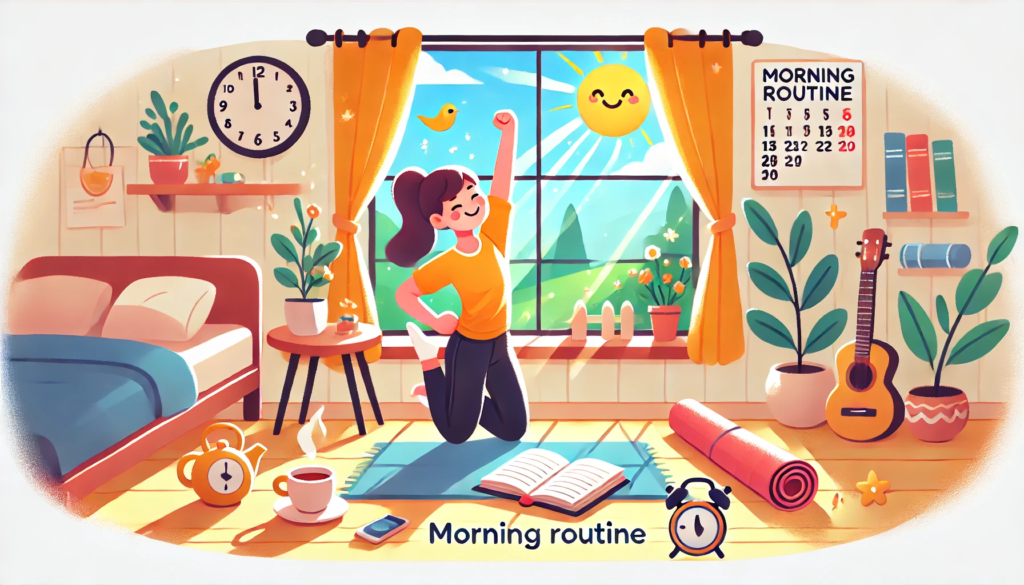
A morning routine helps start the day right. Waking up at the same time each day is essential. It helps your body set a natural clock, and you can feel more awake and ready.
Try to wake up with a gentle alarm. Some alarms sound like birds singing. Natural light also helps. Open the curtains as soon as you wake up. Sunlight makes you feel bright and happy.
Doing a little exercise in the morning is good, too. It helps your body and mind feel better. You can stretch your arms and legs or take a quick walk outside. These simple activities can make you feel less stressed.
There are ways to feel calm and focused in the morning. Take deep breaths. Think about things that make you happy. These actions help you stay grounded.
Apps can help you with your routine. Some apps provide relaxing sounds, and others guide you through exercises. These tools can make your morning great.
Start your day with a good routine. You will feel better all day long and reduce your depression risk!
Incorporating Physical Activity into Your Daily Habits
Regular physical activity is crucial for maintaining both physical and mental health. Exercise has been shown to reduce symptoms of depression and anxiety, improve mood, and enhance overall well-being. Incorporating physical activity into your daily routine doesn’t have to be complicated. Simple activities like taking a short walk, doing a few jumping jacks, or practicing yoga can make a significant difference.
Physical activity helps release endorphins, the body’s natural mood lifters, and can also improve sleep, increase energy levels, and boost self-esteem. By making exercise a regular part of your day, you can support your mental health and build resilience against depressive symptoms.
Daytime Activities and Physical Activity

Our daytime activities shape our day. Eating good food helps our brains. It makes us feel better and work better, too. College students who adhere to a Mediterranean diet show significant improvements in depression scores compared to those consuming unhealthy foods. Let’s discuss some ideas.
Eating healthy is essential. Choose quick meals that are good for you. Try fruits, nuts, and yogurt. These foods are tasty and help your body.
Set small goals for your day. It feels good to achieve them. You can write down tasks like reading for 20 minutes or finishing homework.
Focus is key. Find a quiet place to work. If you get distracted, take a deep breath and try again.
Taking breaks helps us stay fresh. Stand up, stretch, or walk around. This stops you from feeling tired and worn out.
Relax and have fun, too. Read a book or listen to your favorite songs. This will keep your mind happy and calm.
Remember to balance your activities. This keeps your mind and body strong. Enjoy your day!
Nourishing Your Body and Mind
A healthy diet is essential for maintaining good physical and mental health. Eating a balanced diet rich in whole, fresh foods can help reduce the risk of depression and improve overall mental health. This is because a healthy diet provides the necessary nutrients and energy for optimal brain function.
The Importance of Healthy Eating
Healthy eating is crucial for maintaining good mental health. A diet rich in fruits, vegetables, and whole grains can help lower the risk of depression by about 6 percent. The Mediterranean diet, in particular, has been associated with lower rates of depression compared to pro-inflammatory diets. Additionally, a healthy diet can help improve overall physical health, reducing the risk of chronic diseases such as heart disease and diabetes.
By focusing on nourishing your body with healthy foods, you can support both your physical and mental well-being. Simple changes, like incorporating more fruits and vegetables into your meals or choosing whole grains over processed foods, can have a significant impact on your overall health and mood.
By following these guidelines, the new sections will seamlessly integrate into the existing article, providing valuable information and practical advice to readers while maintaining a consistent tone and style.
Evening Routine
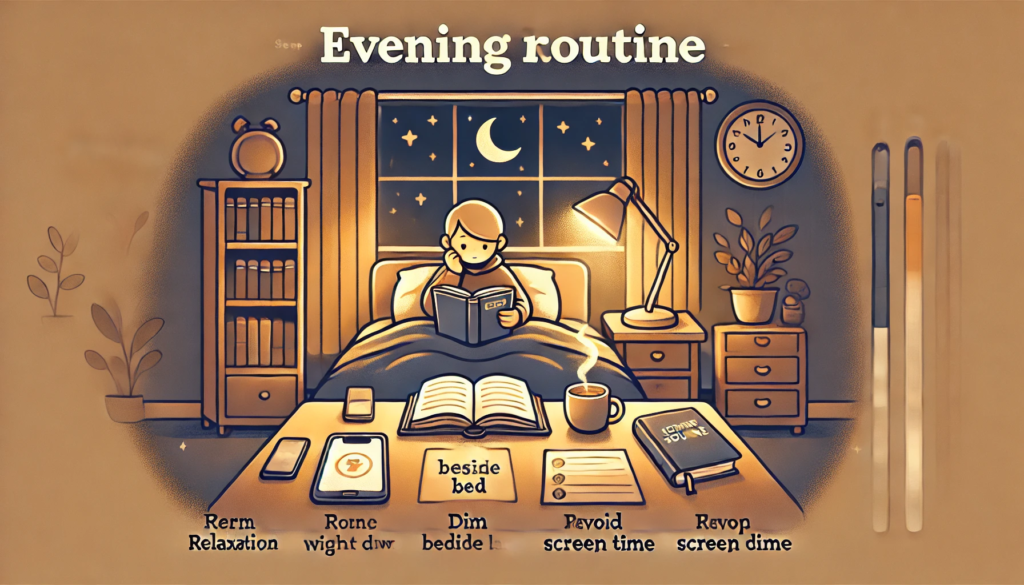
Having a good evening routine helps you sleep better. Tonight, let’s dive into some things you can do before bedtime.
First, try to create a calming routine. This means doing things that make you feel relaxed and happy. You might enjoy reading a book, listening to soft music, or having a warm bath.
Next, try to limit your screen time. Screens from phones, tablets, or TVs can make it hard for you to fall asleep. Read a book or draw instead so your mind can rest.
Journaling is another excellent idea. Write about your day, thinking about what went well and what you learned. This will help your mind feel more transparent and more peaceful.
It’s important to recognize small achievements. Did you help a friend today? Did you learn a new word? Celebrate these moments. They make each day extraordinary.
With these tips, your evening can become a perfect ending to the day, contributing to higher life satisfaction. Sleep tight!
Building Social Connections

Connecting with others is essential. Friends and family help us feel good by listening to and supporting us. This is called social support, but it is also important to consult a mental health professional for expert guidance and support.
Role of Social Support in Managing Depression
When people feel sad for a long time, they might have depression. Friends and family can make a big difference by helping us talk about our feelings, laugh, and feel loved, which makes us feel better and less alone. Understanding and tracking anxiety symptoms is also crucial, as they can indicate the severity of anxiety and its correlation with overall health.
Tips for Staying Connected with Friends and Family
Call or Video Chat: You can talk to friends or family on the phone, but seeing their faces on a video call is even better.
Plan Fun Activities: You can play games or do crafts together. This helps everyone feel happy.
Send Messages: Sending a text or a funny picture is a nice way to stay in touch.
Share Your Thoughts: Talk about your day and listen to others. Sharing helps people feel close.
Social connections are like a giant hug for the heart. Keep connected to stay happy and strong.
Professional Support from a Mental Health Professional

Sometimes, we feel sad or worried. It’s okay to talk to someone about it. But when should you ask for help from a therapist or counselor?
If you feel sad all the time or can’t sleep, it might be time to talk to a therapist. A randomized controlled trial has shown that professional support can significantly improve mental health outcomes. A counselor can also help if you have trouble paying attention or feel stressed at school.
You can find help at different places. Schools often have counselors to talk to students. You can ask a parent or teacher to help find a local therapist.
You can also call free phone numbers. They help you talk about feelings and don’t cost anything.
Remember, talking to someone can make you feel better. It’s important to know you’re not alone.
Conclusion
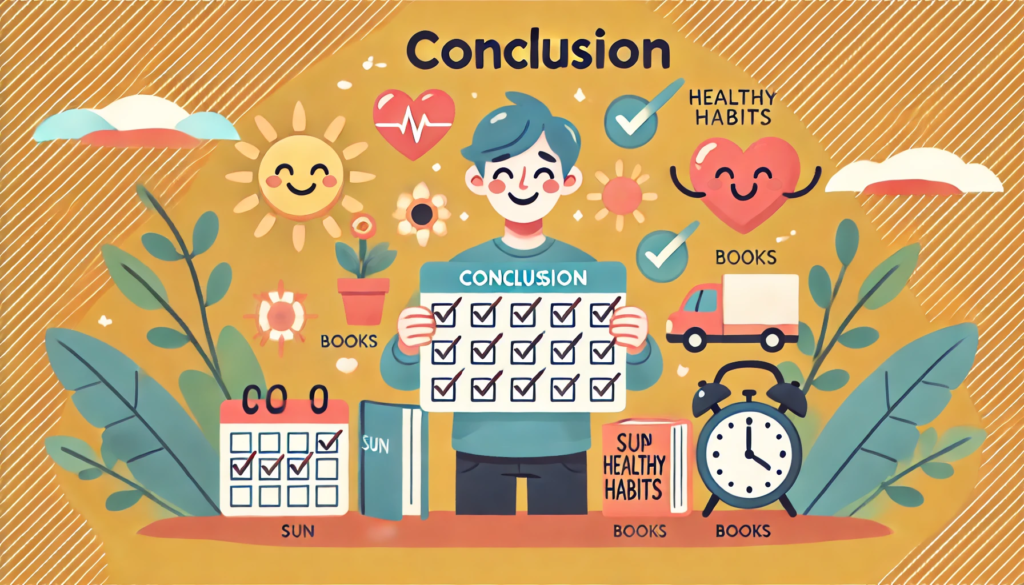
It’s great to have a daily routine. It helps you stay organized and feel calm. Having a plan makes the day more manageable and less stressful.
Remember, your routine should fit you. You can choose what works for you. Maybe you study better in the morning. Or perhaps you would like to play after lunch. You decide!
Try different things to see what you like best. A good routine can help you feel happier and do more each day. Start planning your routine today!
Additional Resources
If you want more help or information, there are many places to look. Here are some great resources:
Books, Apps, and Websites
Books can help you learn more about feelings and how to manage them. Look for books in your school library or ask a teacher for suggestions.
There are also apps specifically made to help with feelings and emotions. These apps can teach you tools to feel better and manage your thoughts.
Websites are another good place to find information. Some websites have articles and stories about people who have felt the same way. These can give you ideas on what might help you, too.
Support Groups and Online Communities
Support groups bring people together to share their stories and help each other. You can talk to others who feel similar and find out what helps them. Some of these groups meet in person, while others are online.
Online communities also let you chat with people from all over the world. You can join a community focused on wellness and support. This way, you can always find someone to talk to and share tips.
Remember, asking for help is strong and brave. Use these resources to learn more and feel better.

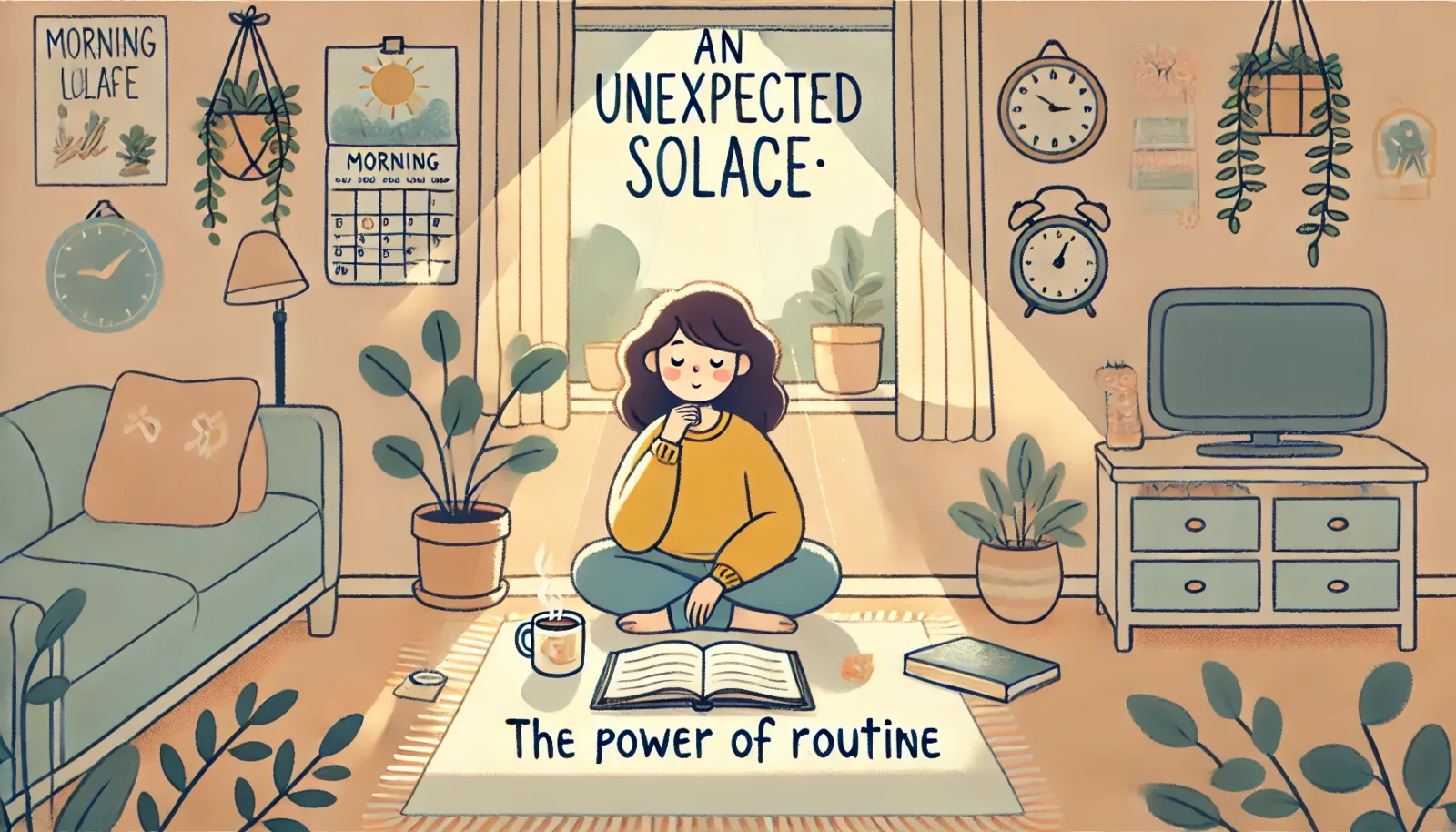




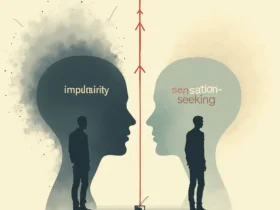
Leave a Reply